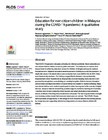Education for non-citizen children in Malaysia during the COVID-19 pandemic: A qualitative study

Abstract
The COVID-19 pandemic disrupted schooling for children worldwide. Most vulnerable are non-citizen children without access to public education. This study aims to explore challenges faced in achieving education access for children of refugee and asylum-seekers, migrant workers, stateless and undocumented persons in Malaysia during the pandemic. In-depth interviews of 33 stakeholders were conducted from June 2020 to March 2021. Data were thematically analysed. Our findings suggest that lockdowns disproportionately impacted non-citizen households as employment, food and housing insecurity were compounded by xenophobia, exacerbating pre-existing inequities. School closures disrupted school meals and deprived children of social interaction needed for mental wellbeing. Many non-citizen children were unable to participate in online learning due to the scarcity of digital devices, and poor internet connectivity, parental support, and home learning environments. Teachers were forced to adapt to online learning and adopt alternative arrangements to ensure continuity of learning and prevent school dropouts. The lack of government oversight over learning centres meant that measures taken were not uniform. The COVID-19 pandemic presents an opportunity for the design of more inclusive national educational policies, by recognising and supporting informal learning centres, to ensure that no child is left behind.
Collections
Date
2021-12-02Author
Loganathan, Tharani
Chan, Zhie X.
Hassan, Fikri
Kunpeuk, Watinee
Suphanchaimat, Rapeepong
Majid, Hazreen Abdul